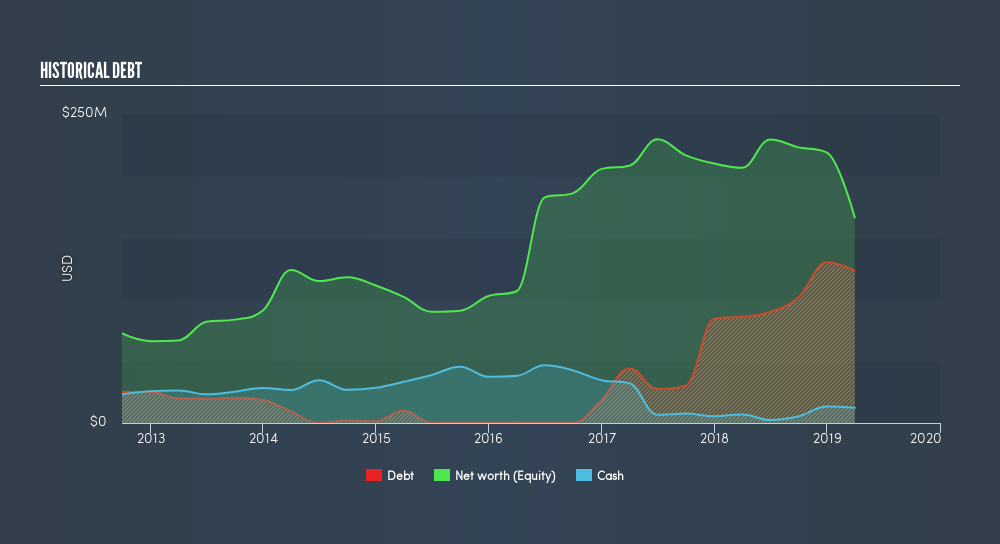- United States
- /
- Food
- /
- NasdaqGS:FARM
Here's Why Farmer Bros (NASDAQ:FARM) Is Weighed Down By Its Debt Load

Legendary fund manager Li Lu (who Charlie Munger backed) once said, 'The biggest investment risk is not the volatility of prices, but whether you will suffer a permanent loss of capital.' It's only natural to consider a company's balance sheet when you examine how risky it is, since debt is often involved when a business collapses. We note that Farmer Bros. Co. (NASDAQ:FARM) does have debt on its balance sheet. But the more important question is: how much risk is that debt creating?
Why Does Debt Bring Risk?
Debt and other liabilities become risky for a business when it cannot easily fulfill those obligations, either with free cash flow or by raising capital at an attractive price. Ultimately, if the company can't fulfill its legal obligations to repay debt, shareholders could walk away with nothing. However, a more common (but still painful) scenario is that it has to raise new equity capital at a low price, thus permanently diluting shareholders. Of course, debt can be an important tool in businesses, particularly capital heavy businesses. The first step when considering a company's debt levels is to consider its cash and debt together.
Check out our latest analysis for Farmer Bros
What Is Farmer Bros's Net Debt?
As you can see below, at the end of March 2019, Farmer Bros had US$123.2m of debt, up from US$86.2m a year ago. Click the image for more detail. However, it does have US$12.3m in cash offsetting this, leading to net debt of about US$110.9m.

A Look At Farmer Bros's Liabilities
Zooming in on the latest balance sheet data, we can see that Farmer Bros had liabilities of US$91.8m due within 12 months and liabilities of US$194.7m due beyond that. Offsetting these obligations, it had cash of US$12.3m as well as receivables valued at US$66.1m due within 12 months. So its liabilities outweigh the sum of its cash and (near-term) receivables by US$208.1m.
Given this deficit is actually higher than the company's market capitalization of US$201.2m, we think shareholders really should watch Farmer Bros's debt levels, like a parent watching their child ride a bike for the first time. Hypothetically, extremely heavy dilution would be required if the company were forced to pay down its liabilities by raising capital at the current share price.
We measure a company's debt load relative to its earnings power by looking at its net debt divided by its earnings before interest, tax, depreciation, and amortization (EBITDA) and by calculating how easily its earnings before interest and tax (EBIT) cover its interest expense (interest cover). Thus we consider debt relative to earnings both with and without depreciation and amortization expenses.
While we wouldn't worry about Farmer Bros's net debt to EBITDA ratio of 3.4, we think its super-low interest cover of 0.35 times is a sign of high leverage. In large part that's due to the company's significant depreciation and amortisation charges, which arguably mean its EBITDA is a very generous measure of earnings, and its debt may be more of a burden than it first appears. It seems clear that the cost of borrowing money is negatively impacting returns for shareholders, of late. Even worse, Farmer Bros saw its EBIT tank 87% over the last 12 months. If earnings continue to follow that trajectory, paying off that debt load will be harder than convincing us to run a marathon in the rain. When analysing debt levels, the balance sheet is the obvious place to start. But ultimately the future profitability of the business will decide if Farmer Bros can strengthen its balance sheet over time. So if you're focused on the future you can check out this free report showing analyst profit forecasts.
But our final consideration is also important, because a company cannot pay debt with paper profits; it needs cold hard cash. So we always check how much of that EBIT is translated into free cash flow. Over the last three years, Farmer Bros saw substantial negative free cash flow, in total. While that may be a result of expenditure for growth, it does make the debt far more risky.
Our View
On the face of it, Farmer Bros's conversion of EBIT to free cash flow left us tentative about the stock, and its EBIT growth rate was no more enticing than the one empty restaurant on the busiest night of the year. And furthermore, its level of total liabilities also fails to instill confidence. Taking into account all the aforementioned factors, it looks like Farmer Bros has too much debt. While some investors love that sort of risky play, it's certainly not our cup of tea. Given our concerns about Farmer Bros's debt levels, it seems only prudent to check if insiders have been ditching the stock.
When all is said and done, sometimes its easier to focus on companies that don't even need debt. Readers can access a list of growth stocks with zero net debt 100% free, right now.
We aim to bring you long-term focused research analysis driven by fundamental data. Note that our analysis may not factor in the latest price-sensitive company announcements or qualitative material.
If you spot an error that warrants correction, please contact the editor at editorial-team@simplywallst.com. This article by Simply Wall St is general in nature. It does not constitute a recommendation to buy or sell any stock, and does not take account of your objectives, or your financial situation. Simply Wall St has no position in the stocks mentioned. Thank you for reading.
About NasdaqGS:FARM
Farmer Bros
Engages in the roasting, wholesale, equipment servicing, and distribution of coffee, tea, and other allied products in the United States.
Fair value low.
Similar Companies
Market Insights
Community Narratives



